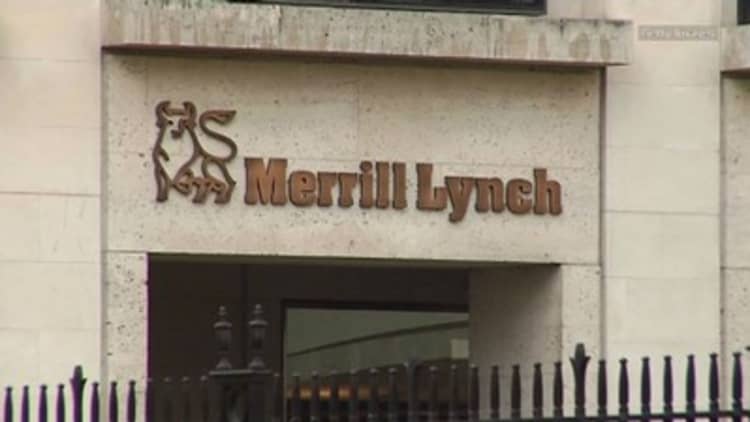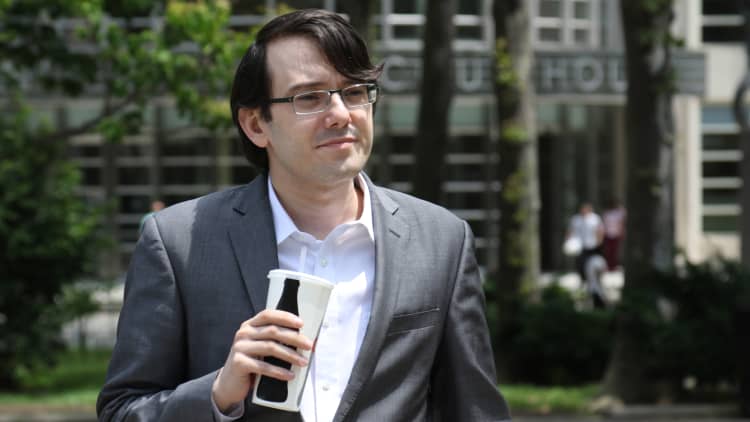
A Merrill Lynch salesman Wednesday described his shock at learning in February 2011 that Martin Shkreli's hedge fund was unable cover a short trade that left Merrill Lynch with a $7 million loss a day after assuring the firm the trade could be covered.
Steven Stich, the salesman, also testified he became "angry" and was upset after Shkreli threatened Merrill Lynch if it used the legal system to try to recoup its money from his hedge fund MSMB Capital on a short trade involving 11 million shares of Orexigen Therapeutics.
"Martin said he had some system issues on his side, that it was a mistake, he apologized for putting me in this position, that it would not be in our best interest to pursue this," Stich testified at Shkreli's securities fraud trial in Brooklyn, New York, federal court.
Shkreli also said, "That he knew people, that he would find ways to pay us back, [and that it would] not be wise to go to legal proceedings or make anybody aware of it," Stich testified.
And Shkreli suggested that Merrill Lynch, which was handling electronic trading for his hedge fund, was large enough that it could "absorb the loss," Stich said.
Darren Blanton, a Dallas-based investor who had invested with Shkreli's hedge fund, also testified Wednesday that he later learned that the administrator that MSMB Capital purported to employ never actually worked for that hedge fund. Blanton also said that MSMB Capital's purported outside auditor said "no comment" when asked if it actually did such work for the fund.
Stich's and Blanton's testimony helped prosecutors continue to paint a picture of Shkreli as someone who talked a big game about his trading prowess and assets under his control, only to be exposed as an alleged sham.
Prosecutors also used Stich's testimony to underscore the claim that Shkreli's hedge fund was essentially broke and unable to cover its short on Orexigen at the same time Shkreli was telling one investor that MSMB Capital had between $30 million and $40 million of assets under management.
Shkreli, 34, has pleaded not guilty to charges that he defrauded investors at MSMB Capital and another hedge fund he ran, and that he later looted the drug company he founded, Retrophin, to repay those investors.
Stich testified that he became aware on Feb. 1, 2011, that MSMB Capital had a short position in Orexigen. In a short sale, the investor is selling borrowed shares to try to make a profit if the share values go down, pocketing the price difference when he returns the shares he borrowed.
On that same day, Stich said, Shkreli asked for "a favor" — that Merrill Lynch lower what it was charging MSMB Capital in commissions for processing its trades on Orexigen.
Stich said Shkreli, in discussions with him that day, sounded normal and did not express any concern about the size of his fund's position in Orexigen.
When Stich asked Shkreli if he was able to "locate" shares in Orexigen to cover the amount of shares he had sold short, "He said, 'yes,'" Sitch testified. "I asked him if he was sure, and he said, 'Yes.'"
If Shkreli did not have the ability locate, or find, shares in Orexigen, he would be unable to deliver them to the buyer of those shares in the short-sell trade. That would, in turn, leave Shkreli, and by extension Merrill, in the position of having to cover any losses incurred from such a position.
On Feb. 2, 2011, the day after making those assurances, Stich said he and a Merrill Lynch manager called Shkreli to discuss getting data they needed to consider reducing the commissions for the trade.
"Martin's first comment ... was that the commission rate was the least of our problems," Stich said. "He could not pay for the trade."
"I took that to mean he didn't have enough assets to hold a position of that size, to pay for that trade," Stich said. "My reaction was shock and was trying to understand what was going on."
During a follow-up call, Shkreli claimed that he had a systems problem before the loss, and threatened Merrill Lynch if it sued or otherwise used legal means to recoup its money.
Stich said he was angry and upset "that he effectively threatened us, left us with an open 11 million-share short position on a stock with volume drying up."
Stich said Merrill Lynch then "had to go out and buy 11.3 million shares of [Orexigen] stock in the open market, which caused us to lose over $7 million to be able to deliver stock."'
Merrill Lynch later sought to recoup its loss through arbitration with Shkreli, and the firm obtained what Stich said was a $1.3 million settlement.
A prosecutor asked Stich if he had ever before dealt with a hedge fund that said it had a "locate" on a stock for a short sale when it actually did not have such a locate.
"Not specifically around having a locate," Stich said. "There was an example in my experience of a hedge fund that was fraudulent around the assets they had under management and not being able to pay for their trades."

— Additional reporting by Zachary Basu.


